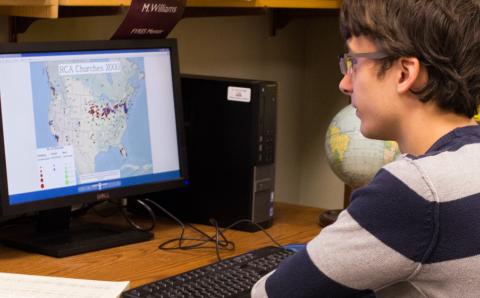The Committee to Study Religious Persecution and Liberty has delivered its report, and it does not mince words. It called the Christian Reformed Church’s efforts to date “admirable but insufficient.”
The authors of the report wrote that the denomination’s Ecumenical and Interfaith Relations Committee (EIRC) has not addressed persecution directly: neither the church’s Office of Social Justice (OSJ) or the Christian Reformed Centre for Public Dialogue (CRCPD) in Canada has placed religious persecution or religious freedom near the top of their agendas. The denomination itself has provided few materials that highlight religious persecution as a matter of concern for public worship, and The Banner has addressed the problem of persecution only half a dozen times per year on average since 9/11 “with no serious framing or context.”
The authors noted that there is “an ominous quickening of the pace of religion-based persecution” over the past decade. “One of the most agonizing facts about religious persecution today is that Christianity is facing near eradication in many areas of the Middle East, the birthplace of the faith.”
“We call the denomination and its churches to refocus on this problem,” the report’s authors said.
The committee’s mandate came from Synod 2013, which appointed the committee to, among other things, propose individual and group action to “intercede on behalf of those who are subject to religious persecution or denied religious liberty at home or abroad.”
The committee laid out a framework of biblical, historical, and confessional perspectives and noted that the their common message is quite clear: “Even if our sovereign God uses persecution for his purposes, we must still view the experience of persecution as a real evil that we have an obligation to confront as a church and as individuals.”
What is less clear is how to confront the problem. The committee recommended two main approaches: that the CRC orient itself around the problem of religious persecution and that it mobilize the church to act.
“We emphasize prayer—more specifically, prayer as part of public worship—precisely because it is a key starting point in building a faith-based movement against persecution,” the authors said. “The process of prayer, of naming suffering and the people who suffer . . . is deeply formative.” It recommended that Synod 2016 encourage every congregation to appoint a prayer coordinator to keep up on religious persecution issues and advise officebearers about developments and foster regular prayer for people suffering religious persecution.
Additionally, through worship, Bible study, and adult education, churches should focus congregational life around stories of persecution that are often lost in the busyness of church life. “The denomination has done relatively little along these lines,” the committee said. It noted that OSJ has highlighted the International Day of Prayer with resources, but said that “these resources are not extensive and need updating.” So it is urging synod to instruct the CRC’s Board of Trustees to instruct OSJ to expand the practice of urging congregations to participate in the International Day of Prayer. Beyond that, the study committee urged the denomination to develop its own internal resources for supporting the church in confronting the issue of persecution. The committee produced original resources for adult education and Bible study. Those can be found at a website the committee created as a companion to its report: crcna.org/persecution.
The committee noted that the CRC’s wider ecumenical engagement offers more possibilities for churches to hear the stories behind the statistics on persecution. Membership in the World Communion of Reformed Churches (WCRC) provides ongoing contact with Reformed churches around the world that are faced with interreligious conflict or persecution. Global Christian Forum, which held a 2015 conference dealing with the themes of the study committee report, offers possibilities for the CRCNA to disseminate much more information.
The study committee said that the church also needs to mobilize members to act. “Church members as Christian citizens can and should be engaged at both the broadest and most specific levels. But churches as institutions should shape the moral vision of their members and speak prophetically to the larger society while refraining from the technical and specific work of public policy.”
To that end, the report calls OSJ and CRCPD to help mobilize the denomination around this issue by making religious persecution one of their top three priorities. The report specifically recommended devoting more staff resources to provide up-to-date information about persecution to CRC congregations. One way to do that is by collaborating with other groups, such as the Henry Institute at Calvin College, the Center for Public Justice in Washington, D.C., and Voice of the Martyrs, which already focus attention on issues of religious persecution and religious liberty.
The authors conclude with the acknowledgement that religious persecution is one of the great moral challenges of our time. “While we should be concerned about doing more damage than good, we ought not let that concern paralyze us. We called to act—all of us.”
The full text of the committee’s report can be found at crcna.org/persecution. Synod 2016, the CRC’s annual leadership meeting, will discuss the report when delegates gather in June in Grand Rapids, Mich.
About the Author
Gayla Postma retired as news editor for The Banner in 2020.









